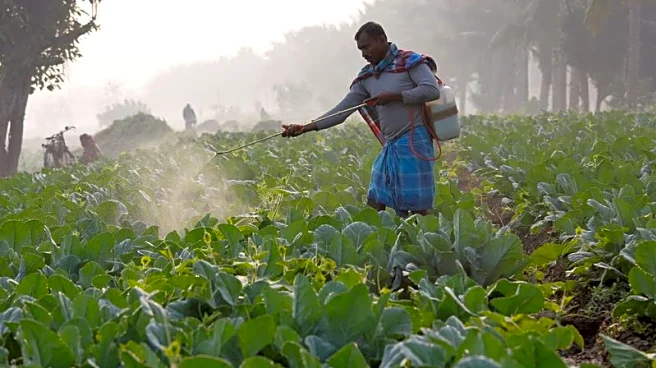What is the story about?
What's Happening?
Rosie Grant, an archivist and social media personality based in Los Angeles, has released a unique cookbook titled 'To Die For: A Cookbook of Gravestone Recipes.' The book features recipes etched on tombstones, celebrating the lives of the deceased through their favorite dishes. Grant's interest in tombstone recipes began during a pandemic internship at the Congressional Cemetery in Washington, D.C., where she discovered the connection between food and memory. Her social media presence, particularly on TikTok, has grown significantly as she shares these recipes and the stories behind them. The cookbook includes 40 recipes, each accompanied by memories and stories from the families of the deceased.
Why It's Important?
This cookbook highlights the cultural significance of food as a medium for preserving memories and celebrating life. By sharing these recipes, Grant offers a unique way to honor the deceased, fostering a sense of community and continuity. The project also challenges societal taboos around death, presenting it as a life-affirming concept. The cookbook's success on social media underscores the public's interest in personal stories and the emotional connections tied to food. It provides a platform for families to share their loved ones' legacies, promoting a deeper understanding of community and heritage.
What's Next?
Grant's cookbook is likely to inspire more people to explore the idea of memorializing loved ones through recipes. As her social media following continues to grow, she may receive more submissions from families wishing to share their own tombstone recipes. This could lead to further editions of the cookbook or new projects that explore the intersection of food, memory, and legacy. Additionally, the cookbook may encourage discussions about how society views death and the ways in which it can be celebrated.
Beyond the Headlines
The concept of tombstone recipes opens up discussions about the ethical and cultural dimensions of memorializing the deceased. It raises questions about how we choose to remember loved ones and the role of food in cultural heritage. The project also highlights the importance of storytelling in preserving history and fostering community connections. By focusing on personal narratives, Grant's work challenges traditional notions of legacy and encourages a more inclusive approach to remembering those who have passed.
















